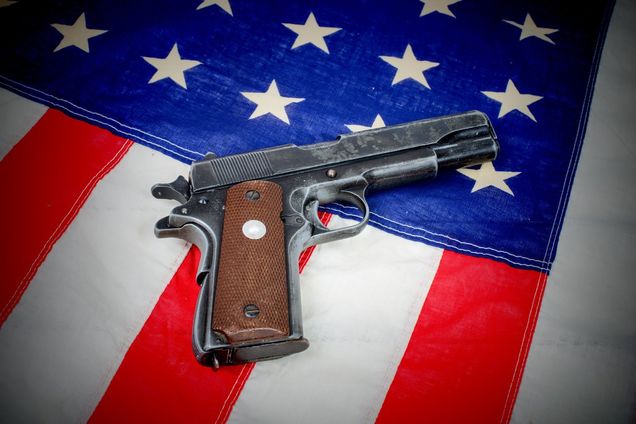By picom
Personalized Handgun Law Backfires, by Merissa Pico
Like a gun might, this New Jersey legislature’s bill backfired. In 2002, New Jersey’s democratically controlled legislature passed the Childproof Handgun Law, which aimed to promote the use of personalized handguns.
Personalized guns, or “smart guns,” as they are also known, use technology so the guns can only be used by an authorized or recognized user.
The 2002 law, which was signed into law by then Governor James McGreevey, requires all handguns sold in New Jersey to be smart guns within 30 months of personalized handguns becoming available anywhere in the country. The statute tasks the New Jersey Attorney General with determining which handguns qualify as smart guns and when smart guns have become available as set forth under the law. In other words, it would not matter if a smart handgun was actually sold or not; as long as a smart handgun was available for sale anywhere in the nation, the clock would start and within 30 months, all handguns sold in New Jersey would have to be smart guns.
According to the 2002 law’s sponsor, New Jersey State Senate Majority Leader Loretta Weinberg (D-Bergen), the 2002 law’s objective was to stimulate the “research, development and manufacture” of smart guns.
Ironically, but perhaps not surprisingly, the law has had the opposite effect: it inadvertently stunted the availability of personalized handguns nationwide. Fifteen years since its enactment, smart handguns are still not available for purchase in the United States. This is despite the fact that the technology exists; smart guns are available for sale in Europe and Asia.
Viewing the New Jersey law as an attack on the second amendment, the pro-gun sector has stifled any movement in making smart guns available. In addition to one gun store in California, in 2014, one Maryland gun storeowner, Andy Raymond, set out to sell the first smart gun in the nation. However, like the California store, Raymond decided not to go through with making smart guns available for sale, after both received hundreds of protests on his store’s Facebook page as well as death threats. If Raymond or the California store had successfully done so, the thirty-month clock in New Jersey’s 2002 law would have started, an effect that the pro-gun sector was well aware.
While it is clear that the 2002 law effectively entrenched the standstill on smart gun development, it should be noted that the pro-gun lobby has not necessarily embraced the smart gun initiative with open arms over the years.
Opponents of the 2002 law have objected to the state-mandated market for smart guns, believing that a market for smart guns, if there should be one, should emerge without any government intervention. Further, many gun owners have concerns about the reliability of the smart gun technology, fearing that the technology will falter when and if they need it to protect their lives.
An attempt to fix this legislative conundrum that New Jersey’s legislature created for themselves and the rest of the country, the legislature in 2016 introduced a new bill, S816, to amend the 2002 law. Also sponsored by Senator Weinberg, S816 would repeal the portions of the 2002 law that would have made it illegal to sell traditional handguns once personalized hand guns become available, thereby effectively eliminating the technology freeze. Additionally, S816 mandates that firearms merchants and dealers maintain an inventory of at least one model of smart gun to sell. Under the bill, the Attorney General would determine on which smart guns would be acceptable.
The democratically controlled New Jersey senate approved the bill in February of 2016 by a vote of 21-13. New Jersey governor and former 2016 U.S. Presidential candidate, Chris Christie, pocket vetoed the bill in September of 2016. A pocket veto means that the governor does not return the bill to the New Jersey legislature; therefore, the veto cannot be overridden. In his strongly worded conditional veto message, Governor Christie said the new bill was the latest in the “relentless campaign by the Democratic legislature to make New Jersey as inhospitable as possible to lawful gun ownership and sales.” Believing that the new bill’s mandate is a constraint on business and “likely is unconstitutional under the Commerce Clause,” Governor Christie went on advocate for a full repeal of the 2002 law with no additional mandate.
With the bill having been pocket vetoed and sent back to the statehouse, the New Jersey legislature can either amend the bill to Governor Christie’s liking or it will die in the state senate. If the bill dies, the 2002 law will remain in place in its entirety without any amendment. Therefore, until it is amended or repealed, the law could continue to have the same stifling effect on nation-wide smart gun availability into the unforeseen future.
Senator Weinberg has publically offered to repeal the 2002 law in its entirety if the National Rifle Association (NRA), promised to not impede or block the “research, development, manufacture or distribution of this technology.” However, to date, there has not been any movement on this offer.
It is frequently said that the law lags behind technology. More often than not, this is true (see 1986 Electronic Communication Privacy Act). Yet, this time, the law and legislative process is not lagging behind technology, but rather, with full recognition and understanding, is choosing to stifle technology. Who knew that a little New Jersey law would have such an unintended consequence? For fifteen-years and counting, partisan division and policy differences have kept available technology out of reach from American citizens. Perhaps soon, the technology will become available under conditions favorable to all Americans, politicians and private citizens alike.
 Merissa Pico is from Fort Lee, New Jersey and graduated summa cum laude from Boston University’s College of Communication in 2015 with a B.S. in Mass Communication Studies. She is expected to earn her J.D. from Boston University School of Law in 2018. Merissa will be working at Ropes & Gray in New York City in the summer of 2017 and is looking forward to continuing to explore her interests in entertainment and communications law.
Merissa Pico is from Fort Lee, New Jersey and graduated summa cum laude from Boston University’s College of Communication in 2015 with a B.S. in Mass Communication Studies. She is expected to earn her J.D. from Boston University School of Law in 2018. Merissa will be working at Ropes & Gray in New York City in the summer of 2017 and is looking forward to continuing to explore her interests in entertainment and communications law.
Negotiating with Goliath: Lawmakers’ battle with Uber & Lyft over ridesharing legislation
As I stepped off the plane and into the jet bridge, I already had my Uber app opened on my smartphone, and only a few short minutes after requesting a ride, the driver was calling me to tell say that he was outside baggage claim. This kind of convenience and ease that e-hailing companies like Uber and Lyft provide is what we have grown accustomed to as consumers.
E-hailing companies, or transportation network companies (TNCs), have made finding a ride very convenient for city dwellers and travelers alike. Whether it is one of the main players like Uber or Lyft, or one of the newer startups like Juno, Fasten, or Gett, TNCs have become an integral part of how we travel and for some of us, our everyday lives.
As convenient as TNCs are, legislatures across the country have made it clear that these companies will not be free from regulation. Rather, city and state legislatures have proposed legislation that will both allow TNC, but also protect riders.
In early February 2017, New Jersey Governor Chris Christie signed a new law making the Garden State the most recent of the 36 states to regulate TNCs. This new law, the Transportation Network Company Safety and Regulatory Act, which is similar to Massachusetts’s 2016 law, requires that TNC companies cover up to $1.5 million dollars in liability insurance and that drivers get background checks. However, TNC drivers are still not subject to the same fingerprinting background checks as taxi drivers. Additionally under the law, the public still does not have access to the safety records of drivers, a concession made by lawmakers in its negotiations with Uber. Municipalities are also prohibited from taxing TNC companies, promoting a more uniform single statewide regulation.
The New Jersey legislation did not come without a fight, however, with Uber demanding limits to regulations. In fact, Uber, throughout its many negotiations with city and state legislatures around the country, has consistently threatened to withdraw all of its business in the city or state at issue if the legislature does not adopt its preferred regulations. This is especially true when it comes to the fingerprinting requirement, which Uber particularly opposes. According to Uber, requiring drivers to get fingerprinted would make it harder to recruit drivers. Uber also claims that the requirement would be unfair to minority applicants, as fingerprint background checks only indicate arrests, not convictions, and false arrests are more frequent in minority neighborhoods.
Prior to the enactment of New Jersey’s statewide law, Uber had been in contentious negotiations with many New Jersey cities including Newark, the State’s largest city by population. In the end, Newark and Uber were able to come to an agreement, and Newark passed a now pre-empted ordinance where Uber would pay Newark $10 million in fees, and drivers would be required to get background checks by a nationally accredited third-party, but there would be no fingerprinting requirement.
Austin, Texas, however, had a different experience. Austin’s city council passed an ordinance requiring driver background checks with fingerprinting. Rivals Uber and Lyft joined forces and campaigned for Proposition 1, which would repeal the ordinance. The two companies spent $8 million dollars on advertising, or $200 per vote to get their message across. Yet, the campaign failed to sway voters, and Proposition 1 lost 44% to 56%. The day after the election, Uber and Lyft made good on their threat to withdraw their services from the area, leaving drivers and riders unable to use either app in the Austin area. Uber did the same to other Texas cities Midland, Corpus Christi, and Galveston, leaving because it did not agree with the local ordinances that had been passed.
Ending service so abruptly had a negative impact on riders who had become accustomed to this mode of transportation and drivers who relied on both companies for a source of income. Austin eventually set up a hotline and job fair for these suddenly out-of-work Uber and Lyft drivers. Luckily for Austin, riders and drivers were not left out in the lurch for too long, as entrepreneurs and new e-hailing companies quickly filled the void left by the two giants. Uber and Lyft left on May 9th and by the summer, there were ten companies who were set up and ready to compete. More than that, these new companies were able to get roughly 9,000 drivers to sign up and all of the companies met the August 1 deadline to have at least half of their drivers fingerprinted. All of the companies had to be in full compliance with the ordinance by February 1, 2017.
Ironically, these hard-fought battles between Uber and Lyft and America’s largest cities might all be for naught. Despite Austin’s city council’s win in keeping their city ordinance on the books, the state legislature passed, and on May 29th Governor Greg Abbott signed, a statute that pre-empted Austin’s ordinance. Since a local government only has the authority granted to it by the state, when state and local laws conflict, the local law will typically be pre-empted. Abbott stated, "In Texas we don't believe in heavy-handed, top-down, one-sided regulatory environm
ents that erect barriers for businesses, in Austin, Texas, we're going to override burdensome, wrongheaded regulatory barriers that disrupt the free-enterprise system upon which Texas has been based and upon which has elevated Texas to be the No. 1 state in the entire country for doing business." Texas joined other states, which have increasingly preempted local ordinances. The most recent and notable example is North Carolina’s HB2 law, which pre-empted Charlotte’s anti-discrimination ordinance.
Pre-emption in regards to TNC legislation may not be so terrible, however. There is a great benefit to both the state and companies to have one standard rather than multiple municipal ordinances. With a service such as ridesharing, it is not uncommon for someone to be picked up in one town and dropped off in another. Because of this reality, it may be preferable for the states to take the lead.
New Jersey's law shows the trend is certainly moving in the direction of state legislation, not municipal. However, now the question is will state legislatures remain strong in their positions or will they give in to what Uber and Lyft demand? As we have seen in Austin, there will always be a new company who is willing to comply with the new regulations if Uber and Lyft will not. Therefore, perhaps states should pass the ideal legislation that they feel best protects its citizens and let the market sort itself out. Uber and Lyft have a lot of negotiating power because they are the biggest players, but as we have seen, they do not have an impenetrable monopoly. As the city of Austin found out, the TNC market will not crash if Uber and Lyft leave. There are plenty of worthy “Davids” who would jump at the chance to fill the void of Goliaths Uber and Lyft, even if in the face of stricter regulation.
 Merissa Pico is from Fort Lee, New Jersey and graduated summa cum laude from Boston University’s College of Communication in 2015 with a B.S. in Mass Communication Studies. She is expected to earn her J.D. from Boston University School of Law in 2018. Merissa will be working at Ropes & Gray in New York City in the summer of 2017 and is looking forward to continuing to explore her interests in entertainment and communications law.
Merissa Pico is from Fort Lee, New Jersey and graduated summa cum laude from Boston University’s College of Communication in 2015 with a B.S. in Mass Communication Studies. She is expected to earn her J.D. from Boston University School of Law in 2018. Merissa will be working at Ropes & Gray in New York City in the summer of 2017 and is looking forward to continuing to explore her interests in entertainment and communications law.



